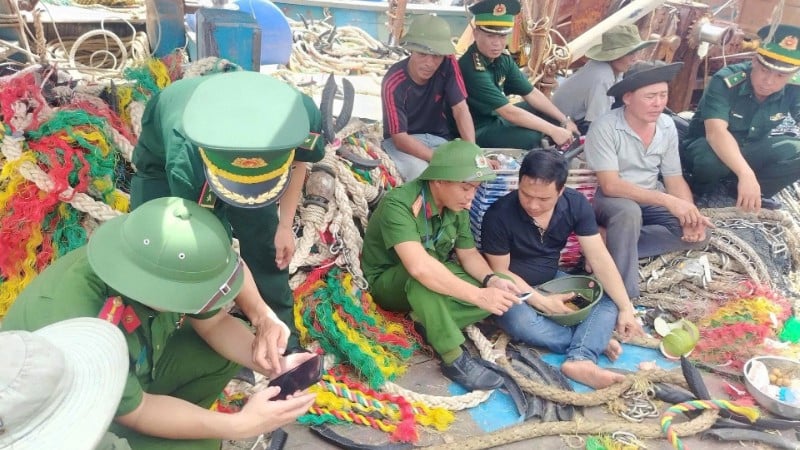
Not only helping people learn to read, write, get acquainted with and use computers and the internet, but also knowing how to operate smartphones, access online public services, make electronic payments... gradually forming "digital citizens" at the border of the Fatherland.
On May 22, 2025, the People's Committee of Nghe An province issued Plan No. 378/KH-UBND to deploy the Digital Literacy Movement for the People in the whole province. The goal is that by the end of 2025, 80% of cadres, civil servants and public employees will have knowledge of digital transformation and be able to use digital platforms; 80% of high school students, university students and adults will be equipped with basic digital skills. By 2026, 100% of cadres, civil servants, workers, primary school students and adults will have digital knowledge and skills, ready to participate in the digital society.
Light of technology in the remote border areas
Late afternoon in Huoi Cang 1 village, Bac Ly commune, a small room in the My Ly Border Guard Station is bustling with voices and laughter. Next to computers and smartphones, H'Mong, Khmu, Thai people... attentively listen to border guards instructing them on how to install applications, register for electronic identification, and submit online public service applications.
The class is simply called “Digital Literacy for the People”, a model deployed by the Nghe An Border Guard to help people in remote areas access technology, shortening the gap in digital transformation. Mr. Cut Van Khuyen, Huoi Cang 2 village, excitedly said: “Before, to do paperwork, we had to travel dozens of kilometers, the forest roads were difficult to travel, and we had to endure the rain and wind. Now, the soldiers have instructed us to do it on the phone, it is very convenient, we can do it anywhere there is a signal.”
Not only young people, middle-aged women are also excited to participate. Ms. Lu Thi Dun, Huoi Cang 1 village, said: "Before, I only heard about online public services, now I have been instructed on-site, I find it easy to understand, easy to do. I also teach other women in the village." According to Lieutenant Colonel Nguyen Xuan Hoa, Deputy Political Commissar of My Ly Border Guard Station, the classes take advantage of available facilities, organized flexibly during off-season farming time, in the afternoon or evening. The content not only teaches digital technology skills, but also integrates propaganda about laws, border security, online fraud prevention, personal information security, etc. "We train core forces in each village so that they can continue to instruct people. Thanks to that, the model not only helps improve digital skills but also forms a "digital safety culture" at the border," Lieutenant Colonel Hoa shared.
Along with the digital class, My Ly Border Guard Station also maintains a literacy class for Hmong women in Pieng Vai village, My Ly commune. The class has 11 students and has been operating regularly for more than six months. The "green-uniformed teachers" not only teach Math and Vietnamese, but also provide guidance on health care, child rearing, and household economic development skills... Lieutenant Colonel Cu Pa Po, Head of the Mass Mobilization Team, said: "Living conditions are still difficult, so the officers have to go to each house to mobilize and urge students to maintain class numbers."
Spread and transform clearly
Not only in the mountainous areas, the Digital Education model has also spread to the border posts of Nghe An coastal line. At Quynh Phuong Border Post in Quynh Mai coastal ward, the digital transformation movement is considered a new direction in propaganda work, gathering union members and youth. Lieutenant Colonel Nguyen Xuan Quang, Deputy Political Commissar of Quynh Phuong Border Post, said: "Digital transformation helps propaganda work, mobilizing youth faster and more effectively. Youth Union branches have exploited social networks such as Zalo, Facebook, Fanpage to disseminate policies, share examples of good people, good deeds...
Each cadre and union member becomes a “digital propagandist”, spreading knowledge and technology skills to the community”. The station also piloted a “paperless conference” model, replacing printed documents with slide presentations and short videos, which are both cost-effective and lively and easy to understand. “Community technology groups” were established to guide people in cashless payments and the use of online public services, contributing to bringing e-government closer to the lives of fishermen. Quynh Phuong Border Guard Station also coordinated with the police force to deploy digital literacy for crew members on fishing boats.
The Digital Literacy Movement is initially bringing about many positive changes in the socio-economic sphere. First of all, it saves time and money, as people can submit applications and look up information right at home, instead of having to travel far, helping to spend more time on productive labor. In addition, business opportunities are also expanding, as many young people know how to take advantage of social networks and e-commerce platforms to introduce and sell local products, make electronic payments, etc.
Thanks to being equipped with digital skills, women and ethnic minorities have more tools to participate in the digital economy, contributing to promoting administrative reform, increasing transparency and service efficiency. People gradually form the habit of using online public services, creating motivation for the government to improve management quality, attract investment... Technology and knowledge become "leverage" to help border areas quickly escape backwardness, gradually catch up with development trends, contribute to building new rural areas, strong borders, and gradually narrowing regional gaps.
On May 22, 2025, the People's Committee of Nghe An province issued Plan No. 378/KH-UBND to deploy the Digital Literacy Movement for the People in the whole province. The goal is that by the end of 2025, 80% of cadres, civil servants and public employees will have knowledge of digital transformation and be able to use digital platforms; 80% of high school students, university students and adults will be equipped with basic digital skills. By 2026, 100% of cadres, civil servants, workers, primary school students and adults will have digital knowledge and skills, ready to participate in the digital society.
Colonel Tran Dang Khoa, Deputy Political Commissar of Nghe An Border Guard, affirmed: “The Digital Popularization Movement is a correct policy, stemming from practical requirements and meeting the development needs of today's society. For the border guard force, this is an inevitable task to improve the level of information technology and digital transformation capacity for officers, soldiers and people on the border.”
Before launching the movement, the Border Guard Command directed units in the entire force to improve their technological knowledge, organize in-depth training on network security, data management, and information system exploitation. Thanks to that, the professional level, thinking and methods of performing tasks of officers and soldiers have been significantly improved. Today, the Border Guard in the digital transformation period not only masters professional software and modern border monitoring systems, but also knows how to apply technology to control, forecast, and handle situations quickly and accurately, strengthening the connection between forces, authorities and people in border areas. This is an important foundation for building a revolutionary, disciplined, elite and modern Vietnam People's Army.
Colonel Tran Dang Khoa emphasized: “Digital transformation is not a one-day task, but it is the “key” to innovating the way of working and promoting the strength of national solidarity in the new era. For the Digital Literacy Movement to truly go into depth, it is necessary to raise awareness and change the mindset of cadres, soldiers and people; organize digital skills training, build a team of “digital core” at the grassroots level; support vulnerable groups, such as the elderly, poor households, ethnic minorities, to access information technology. Propaganda work needs to be diverse, intuitive, easy to understand and easy to do.”
Source: https://nhandan.vn/dua-tri-thuc-so-den-nhung-ban-lang-xa-xoi-post921919.html












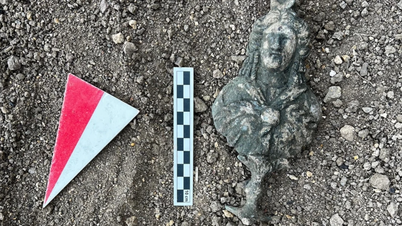






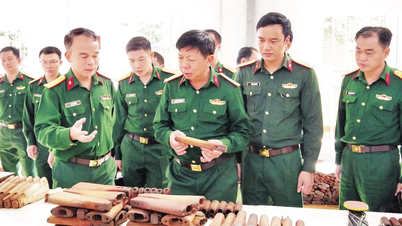



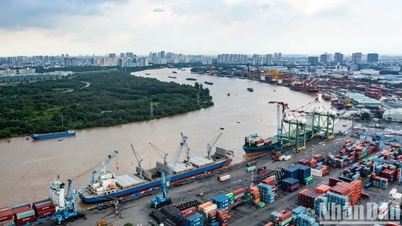























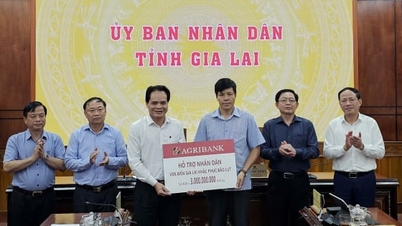
















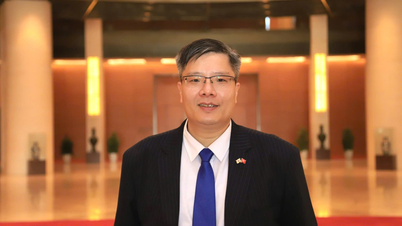




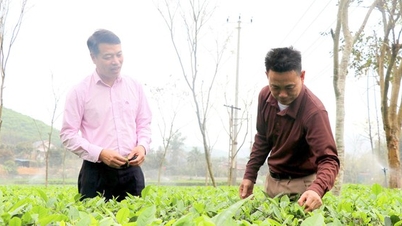

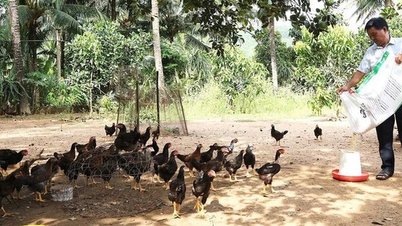
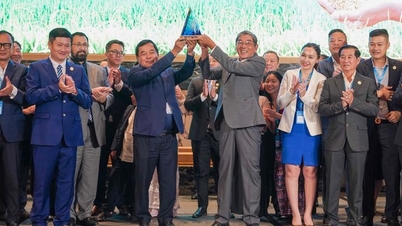



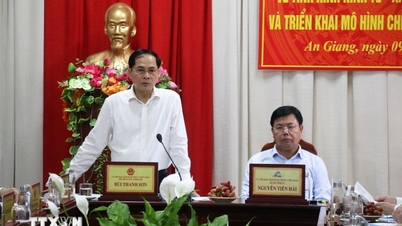



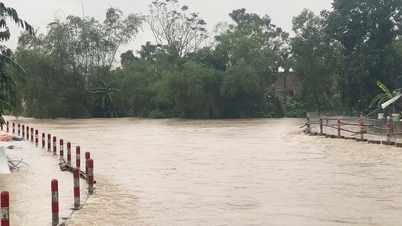





















Comment (0)